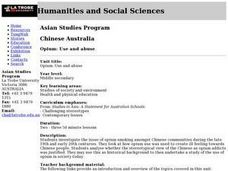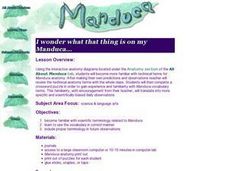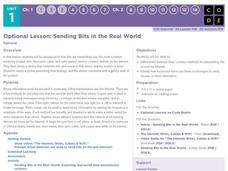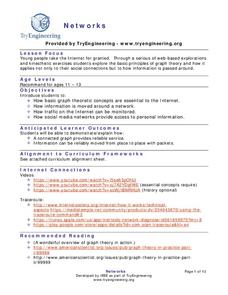Curated OER
Using Negative Numbers
Fourth graders explore negative numbers with this resource. They discuss positive and negative numbers by counting who is present and absent, placing numbers on a number line, and graphing temperatures. Using a variety of activities,...
Curated OER
Opium: Use and abuse
Students investigate the issue of opium smoking amongst Chinese communities during the late 19th and early 20th centuries. They examine how opium use was used to create ill-feeling towards Chinese people.
Curated OER
1492: Using Data to Explain a Journey
Learners examine how Christopher Columbus made his way across the Atlantic. In this data lesson plan students use an Internet program to navigate like Columbus.
Curated OER
Related Lessons Break It
Students brainstorm about the kinds of things that they use at home and school each day. They consider the types of materials out of which these things are made. Keep a list of their repsonses on a large sheet of paper or on the blackboard.
Curated OER
I Wonder What That Thing Is On My Manduca
Students use the internet to gather more information on the anatomy of the Manduca. They make predictions of what the insect will look like when it hatches and complete a crossword puzzle to practice their vocabulary. They continue to...
Curated OER
All About Me
Using technology, learners create and deliver a multimedia autobiographical presentation to present to the class. This ambitious lesson has learners use a variety of sources both old and new; magazines, poster board, the Internet, and...
Code.org
The Need for Addressing
You sunk my battleship via the Internet? Groups of three play a modified game of Battleship using the Internet Simulator. Team members determine how to address messages, so each player knows who the message is for, and refine their text...
Curated OER
Expressing a Condition with "If"
The conditional tense is a tough for learners to master. This resource, originally designed as a quiz, assesses learners on their use of si and the conditional. They practice writing sentences in both the conditionnel présent and passé.
Code.org
Sending Bits in the Real World
A bit optional. How do computers transmit in the real world? Pupils research a device that is used in transmitting bits, then individuals create a poster that presents the information they have learned about their device.
TryEngineering
Networks
Ever wonder how the Internet works? The instructional activity teaches scholars the basics of graph theory and how it applies to the Internet. They perform simulations to see how information is sent on the Internet.
Code.org
Algorithms Detour - Shortest Path
Young programmers investigate the Single Source Shortest Path problem by working in paris to devise their own algorithm. They then progress to using Dijkstra's Algorithm to solve the problem.
Florida Department of Health
Nutrition: Developing Healthy Habits Unit
The focus of the fourth unit in the Youth Risk Behavior Survey Curriculum is on healthy eating and exercise. Class members examine healthy habits data from the YRBD Youth Online Tool, learn about the importance of a healthy diet and...
Social Media Toolbox
Social Media Education
Show what you know about social media! The 16th and final lesson in The Social Media Toolbox gives pupils the opportunity to share their social media experiences with their school communities. Groups identify the most important messages,...
Facebook
Cybersecurity, Phishing, and Spam
Take a serious look at an equally serious topic! Security scholars explore and discuss the methods hackers use to gain access to personal information during a well-written digital citizenship activity. Part of an extensive series, the...
Social Media Toolbox
Ethical Decision Making
When faced with a dilemma, how do journalists decide how much news to use? Social media scholars explore the philosophies of ethical resolution in the first of a 16-part Social Media Toolbox series. Partnered pupils use a Potter Box to...
Annenberg Foundation
America's History in the Making: Classroom Applications Four
The final installment of a 22-part American history series examines the many faces that make up the country's story. From Henry Ford to Tulio Serrano, scholars use biographical evidence and Internet research to uncover the people behind...
Social Media Toolbox
Cyberbullying
What can we do to make our school community more aware of cyberbullying? From The Social Media Toolbox, instructional activity 10 of 16 takes on the tough topic of bullying. Learners research cyberbullying through online research, then...
Judicial Learning Center
Your Day in Court: Criminal Justice
When a person goes on trial for a crime, what options does a court have to render justice? Who are the key players in the legal system? Interested legal scholars answer the inquiries and more using an Internet-based activity, chart, and...
Social Media Toolbox
Social Media Messages
What are the elements of a good social media post? The 13th activity in the 16-part Social Media Toolbox incorporates all of the typical components found in a Facebook or Twitter post. Scholars work together to create great posts based...
Code.org
Public Key Cryptography
Investigate how public key cryptography works. Scholars continue their study of one-way functions and asymmetric keys and apply this information to public key cryptography. They use an app to explore public key cryptography and its...
National Endowment for the Humanities
Who Were the Foremothers of the Women's Suffrage and Equality Movements?
Young scholars complete a unit of lessons on the women who contributed to the early Women's Rights Movement in the U.S. They conduct Internet research, examine images online, develop a list of women, complete a worksheet, and create a...
Curated OER
Children of War
Take a closer look at the impact of war in this language arts and social studies lesson. Middle schoolers use primary sources to conduct research as they relate to the effects of war on children. They compare and contrast the effects of...
Scholastic
Reading Poems From the Academy of American Poets Chancellors
Start a lesson on poetic voice with a peer to peer discussion on what characterizes the strength in the voice with which a writer chooses to express himself/herself. In pairs, readers are tasked with reading and creating T-charts for...
American Physiological Society
It’s the Heart of the Matter
Get the class jumping for joy with a fascinating look at matters of the heart. Learners perform physical tasks, collect and analyze heart rate data, and study conditions that affect heart health. Use the action-packed lesson plan to...

























